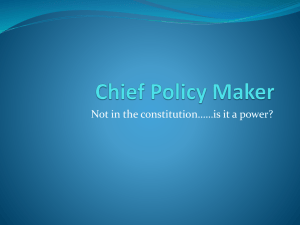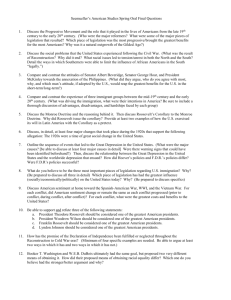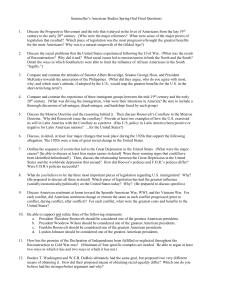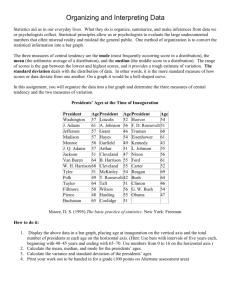Changes in the Balance of Power of the US Government
advertisement
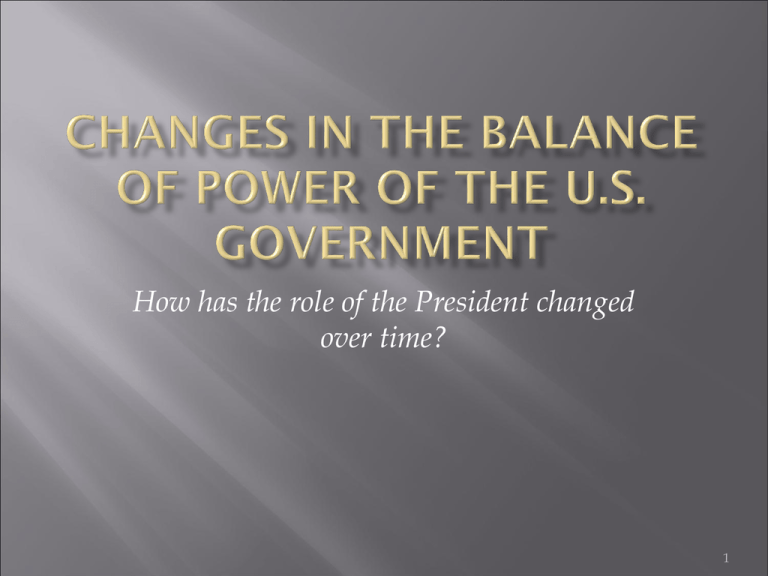
How has the role of the President changed over time? 1 “Be not afraid of greatness. Some are born great, some achieve greatness, and some have greatness thrust upon them.” --William Shakespeare 2 House of Burgesses (VA): John Smith led the colony to form the 1st representative government in the English colonies. Mayflower Compact (Mass): Pilgrims (Separatists), led by William Bradford, sign this document saying the men did “covenant and combine themselves into a civil body politic.” This was the 1st document of self-government in the New World. 3 Frame of Government (Penn): William Penn shares his “Frame of Government” in which his colony is a “holy experiment” and guarantees religious freedom, civil liberties, and elected representation. Bacon’s Rebellion (Va) Nathaniel Bacon leads the farmers and indentured servants in a revolt against Gov. William Berkeley over the lack of support against the Indians in the frontier of the state. This reinforces the idea that the power comes from the people. 4 Albany Plan of Union (1754):Ben Franklin’s plan for Indian affairs, western settlement, and other items of mutual interest be placed under the authority of “one general government” for the colonies. Boston Massacre, Committees of Correspondence, Boston Tea Party, Lexington & Concord (1770-1775): Examples of citizens protesting unfair government practices. 5 2nd Continental Congress (1775) Thomas Jefferson, John Adams, Ben Franklin et al, wrote out or statement of freedom from King George III. “We hold these truths to be selfevident, that all men are created equal, that they are endowed by their creator with certain unalienable rights.” 6 Articles of Confederation (1777) Congress is set up with each state having a single vote. The Congress could conduct foreign affairs, war and peace, and the armed forces. It could issue bills of credit, create coinage, and regulate trade with Indians. It guaranteed the sovereignty of each state. It did not create the office of president, nor did it give the national government the power to tax the people. 7 Shay’s Rebellion (1787) Daniel Shays, a revolutionary officer, leads a rebellion over taxes that threaten to take the land from the farmers. “Without some alteration in our political creed, the superstructure we have been for 7 years raising, at the expense of so much blood and treasure, must fall. We are fast verging to anarchy and confusion!” –George Washington letter to James Madison. 8 U.S. Constitution (1787): The Articles of Confederation is replaced with a 3 branches of national government. Bill of Rights (1791): Individual rights and limits on national government are established. Judiciary Act of (1789): Most important piece of legislation as it implemented the judicial clause of the Constitution. 9 Washington: “First in war, first in peace, first in the hearts of his countrymen.” –Richard Henry Lee. Washington warned of “entangling alliances with Europe” and the danger in political parties. Adams: XYZ Affair, Alienation & Sedition Acts, Federalist versus AntiFederalists. 10 Thomas Jefferson- Republican Agrarianism (a nation of small family farms) Supreme Court Becomes Equal Partner in Gov. with Chief Justice John Marshall. James Madison- War of 1812- President as “Commanderin-Chief”. Hartford Convention (1814) insists that states have the right to “interpose its authority” to protect its citizens from unconstitutional laws. 11 James Monroe: Era of Good Feeling; Monroe Doctrine; creation of 2nd National Bank; Rush-Bagot Treaty (1817) that set the border between U.S. & Canada. The American System (Henry Clay) was supported by Monroe- a national economic plan that would improve East, West, or South because it would eventually help all. 12 Jackson: He welcomed controversy and took on the Congressional leaders of Henry Clay, John C. Calhoun, and Daniel Webster. Tariff of 1828 led Calhoun to force the “Nullification Crisis” in which states wanted to reject any national law that the state chose to oppose. Jackson also killed the 2nd U.S. Bank (Nicholas Biddle). He also rejected the Supreme Court: “John Marshall has made his decision; now let him enforce it.” 13 After Jackson, the presidents tend to regress in power while Congress became the focal point for these issues: Expansion of slavery (Compromises of 1820 & 1850) Nativism (anti-immigration) Henry Clay (West), Daniel Webster (East), John C. Calhoun (South) led the Congressional debates. 14 Lincoln acted as Commander-in-Chief. Main goal: preservation of the Union. View on slavery: he opposed it, but felt it was the job of Congress to outlaw it. 15 After the plan to kill Abe Lincoln, William Seward, Ulysses S. Grant, and Andrew Johnson occurred, the Radical Republicans led a “power play” that dominated presidents until Teddy Roosevelt. FYI: Robert Redford’s new movie, “The Conspirator” is about this incident in history and was filmed in Georgia. 16 The Radical Republicans want to punish the South for the Civil War and the death of Lincoln. President Johnson, from Tennessee, is impeached for In May, 1868, the Senate came within a single vote of taking the unprecedented step of removing a president from office. Although the impeachment trial of Andrew Johnson was ostensibly about a violation of the Tenure of Office Act, it was about much more than that. Also on trial in 1868 were Johnson's lenient policies towards Reconstruction and his vetoes of the Freedmen's Bureau Act and the Civil Rights Act. The trial was, above all else, a political trial. 17 With the Populist & Progressive movements pushing for social reforms, Theodore Roosevelt was the President to re-claim the lost powers of the President. 18 Trust-buster of monopolies. Roosevelt Corollary. Nobel Peace Prize for RussoJapanese war peace agreement. National parks created. Panama Canal created. Reaction to The Jungle and government regulations for consumers & workers. 19 14 Points (including his plan for the League of Nations). Federal Reserve System was created. Continued reforms, including an emphasis on women’s right to vote. 20 Warren G. Harding, Calvin Coolidge, and Herbert Hoover led the 1st truly conservative view (“hands off”) for national government. Result is the Stock Market Crash and the Great Depression. 21 1st Hundred Days Creation of SSA, TVA, CCC, FDIC, WPA, AAA, etc. greatly expanded role of government. New Deal & WWII help to end Great Depression. Court-Packing Plan & Japanese Internment Camps were excessive “power plays”. 22 Berlin Airlift China Turns Communist Korean War U-2 Incident Sputnik Bay of Pigs Cuban Missile Crisis Man on the Moon Détente Olympic Boycotts Berlin Wall Comes Down. Russia Abandons Communism. 23 President Eisenhower felt that the Supreme Court was rushing Civil Rights. President Johnson signs Civil Rights Bill & Voting Rights Bill, but he later feels betrayed by MLK over Vietnam War stance. 24 “Jimmy Who?” wins election in 1976 after Watergate and Ford’s pardon of Nixon. Reagan also came in as an outsider; he helped the country to be “Proud to be an American” again. 25 Young presidents who represented the next generation of leaders after WWII. Presidents who have a stated plan and push hard to gain their objectives. 26 For only the 2nd time in history, a father-son combo is elected as presidents. Both fought Saddam Hussein in Iraq George Sr. was former leader of the CIA. George Jr. gave us Homeland Security after 9/11. 27 With the election of the “Jackie Robinson” of presidents, his promise of “Change” becomes the focus of today. He joined Teddy Roosevelt, Woodrow Wilson, Jimmy Carter (after his term) as winners of the Nobel 28 Great presidents rise to the challenge of a crisis. Domestic policy and international policy must be balanced to achieve greatness. Support of a majority in Congress and the power to choose new Supreme Court justices can add to one’s legacy. 29 30


